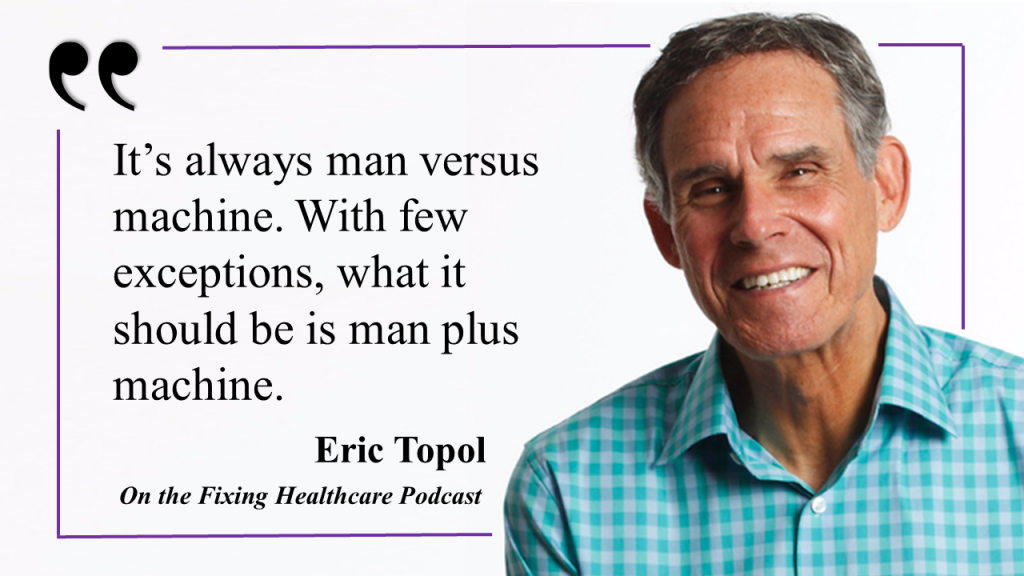Podcast: Play in new window | Download
Subscribe: Spotify | Email | RSS | More
American doctors have gained a reputation for resisting the types of technologies that could make healthcare more convenient and cost-effective. But have physicians really earned their technophobic stigma?
This episode of Fixing Healthcare features Eric Topol, a returning guest who’s back to discuss the tricky intersection between physician culture and healthcare technology.
Topol is a cardiologist, geneticist, researcher and pioneer in the field of digital care. He has published three bestselling books on the future of medicine and serves as editor-in-chief of the popular healthcare news site Medscape. As founder and director of Scripps Research Translational Institute, he is on the cutting edge of genomics and individualized medicine.
He rejoins Fixing Healthcare in its fifth season, which focuses on the culture of medicine, a topic that spans what Dr. Robert Pearl calls, “the good, the bad, the beauty, the ugliness, the things that inspire, and the things about which we are embarrassed.”
Highlights from this interview with Eric Topol
1. On man vs. machine in medicine
The problem we have in AI medical research, it’s always ‘man versus machine.’ With few exceptions, what it should be is man plus machine. The sum of the parts is greater than either of the components.
2. On doctors and their habits
We work in a ritualistic, sclerotic, ossified culture as physicians. So, we stick to our habits. In order to break those, there have to be really strong evidence and peer pressure, and you have to break through the issues of reimbursement and the norms and standard of care. [Physicians] don’t want to worry about legal matters if they’re not seeing someone with the right periodicity because of some breach of what would be norms. We’ve got a lot of things to kind of reset here, and it’ll happen. But as we know, it takes much longer than it should.
3. On telemedicine 2.0
There (are) not many silver linings of this pandemic, but one thing that was important was to show that you could provide care at scale without having to be physically together. It isn’t ideal … but it sure is a lot more convenient and it’s safer when you have an infectious disease that could be lethal. What we have today is telemedicine 1.0. It’s basically a video chat. But I think what’s going to happen, Robert, is that we’re going to see telemedicine 2.0 emerge, where there is data transfer, not just sensor data, and the ability to image through a smartphone, the ability to get a lot of data and scans.
4. On ‘pathetic’ electronic health records
Here it is, almost 2021, and [electronic health records] are truly pathetic. They were set up to be promoting business and billing, never for the patient or the physician. They’re so inadequate that what’s important here as we go more and more into the era of AI, it’s all about the input. And when the inputs are shaky, then you get compromised output.
5. On the future of patient self-diagnosis
Today, the first FDA deep-learning algorithm was a smartwatch diagnosis of atrial fibrillation, but we’re already seeing inroads in skin lesions and skin cancer self-diagnosis, urinary tract infections, ear infections in children, and a long list of things that give patients far more capability to get a doctor-less initial diagnosis.
6. On his New Yorker op-ed: “Why Doctors Should Organize.”
We just recently launched the Osler’s Alliance, and the aspiration is to get all physicians to work together to stand up for patients. That is, to reclaim the soul of medicine, which is that precious relationship that can be restored, needs to be restored … I hope that over time we’ll get the vast majority of physicians to be part of it. Because the singular goal of this alliance is to stand up for patients. … this will be a restoration of the critical [doctor-patient] relationship that is necessary to avoid burnout, to avoid depression, and all the bad parts of healthcare today.
READ: Full transcript of our latest discussion with Eric Topol
Listener note: Years of research and reporting on the culture of medicine will culminate in the publication of Dr. Robert Pearl’s 2021 book titled, “Uncaring: How Physician Culture Is Killing Doctors And Patients.” To learn more, subscribe to his newsletter Monthly Musings on American Healthcare.
* * *
Fixing Healthcare is a co-production of Dr. Robert Pearl and Jeremy Corr. Subscribe to the show via Apple Podcasts or wherever you find podcasts. Join the conversation or suggest a guest by following the show on Twitter and LinkedIn.

